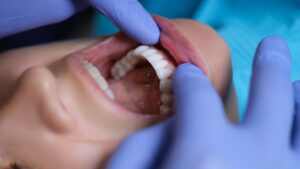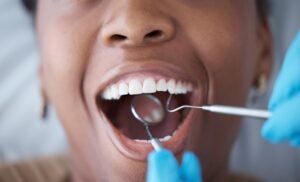-
What Causes Tooth Sensitivity and How to Manage It

Have you ever taken a sip of ice-cold water and felt an unexpected jolt in your teeth? You’re not alone. Tooth sensitivity is a common issue that makes eating, drinking, and even breathing cold air uncomfortable. Most people describe it as a sharp, temporary pain in one or more teeth when exposed to hot or cold temperatures, sweet or acidic foods and drinks, and even pressure from brushing and flossing. Learning what causes tooth sensitivity is the first step toward managing it effectively. Continue reading “What Causes Tooth Sensitivity and How to Manage It”
-
Why You Shouldn’t Ignore Dry Mouth Symptoms

It’s normal for your mouth to feel dry occasionally, such as when you’re dehydrated or nervous, but it shouldn’t feel dry all this time. Chronic dry mouth, or xerostomia, is more than a minor annoyance. It could signal a deeper underlying problem requiring your attention. Plus, it makes you more vulnerable to dental problems. Continue reading “Why You Shouldn’t Ignore Dry Mouth Symptoms”
-
Signs of Oral Cancer
Are You at Risk of Oral Cancer?
The most common form of head and neck cancer, oral cancer affects about 11 people in every 100,000. It is more common in men than in women, in Caucasians than other races, and in older people than younger people. Oral cancer affects the inside of the mouth, and can spread to other areas of your head and neck. It is potentially very dangerous, and has a 63 percent survival rate five years after diagnosis.
 Continue reading “Signs of Oral Cancer”
Continue reading “Signs of Oral Cancer” -
How Diet can Impact your Oral Health
When you eat and drink, what you consume affects the health of your mouth. Interestingly, this is a bidirectional relationship: the health of your mouth also has an impact on the nutrients you consume. Sugary or acidic foods can be harmful to your teeth, while a nutrient-dense diet is beneficial and can actually help prevent gum disease. By making the right choices, you can improve the health of your mouth, which will, in turn, allow you to continue to eat nutritious food.
 Continue reading “How Diet can Impact your Oral Health”
Continue reading “How Diet can Impact your Oral Health” -
8 Tips for Healthy Teeth in 2025

A healthy smile never goes out of fashion. If you’re looking to take better care of your teeth in 2025, follow these eight tips to promote great oral health this year. Continue reading “8 Tips for Healthy Teeth in 2025”
-
The Impact of Stress on Oral Health
 Stress and Your Oral Health
Stress and Your Oral HealthYou probably know that stress can negatively impact your health, with chronic stress manifesting in a wide variety of health conditions. From disturbing your sleep to increasing your risk of heart attack or stroke, the results of poorly managed stress are a problem for your whole body. Did you know that stress also has a negative impact on your oral health? Continue reading “The Impact of Stress on Oral Health”
-
How to Handle Dental Issues When You’re Traveling for the Holidays
 The upcoming holidays are an excellent time to travel, visit family and friends, and relax. But what happens if a dental issue springs up while you’re not at home? This kind of emergency can cause total panic. Are there ways to handle dental issues while you’re traveling? Are there ways to avoid dental problems? Here are some tips on how to handle dental issues while traveling.
The upcoming holidays are an excellent time to travel, visit family and friends, and relax. But what happens if a dental issue springs up while you’re not at home? This kind of emergency can cause total panic. Are there ways to handle dental issues while you’re traveling? Are there ways to avoid dental problems? Here are some tips on how to handle dental issues while traveling.Continue reading “How to Handle Dental Issues When You’re Traveling for the Holidays”
-
The Connection Between Oral Health and Systemic Diseases
The Impact of Oral Health on Your Overall Health
 For years, scientists have been studying the link between oral health and overall health. While research is still ongoing, there are certain connections that are now well-documented. For example, significant associations have been found between periodontal disease and conditions like diabetes, cardiovascular disease, and kidney disease. The common thread linking these diseases is inflammation, and chronic low-level inflammation contributes to oral issues and issues like heart disease, cancer, and cognitive decline. Understanding these connections underscores how important it is to maintain good oral health, in order to promote overall well-being.
For years, scientists have been studying the link between oral health and overall health. While research is still ongoing, there are certain connections that are now well-documented. For example, significant associations have been found between periodontal disease and conditions like diabetes, cardiovascular disease, and kidney disease. The common thread linking these diseases is inflammation, and chronic low-level inflammation contributes to oral issues and issues like heart disease, cancer, and cognitive decline. Understanding these connections underscores how important it is to maintain good oral health, in order to promote overall well-being.
Continue reading “The Connection Between Oral Health and Systemic Diseases” -
What Should You Do After a Root Canal?
What Should You Do After a Root Canal?
A root canal procedure is often essential to relieve pain and save a tooth that has been severely infected or decayed. While the procedure itself can be daunting for many, understanding the root canal recovery process is crucial for ensuring a quick and smooth healing period. This article delves into the best practices and tips for post-root canal care, ensuring that your recovery is as effective and comfortable as possible.
Continue reading “What Should You Do After a Root Canal?”
-
Root Canal Myths Debunked: Is It Considered Oral Surgery?
Clearing Up Concerns About Root Canals
Few dental treatments induce as much anxiety and confusion as root canals. Amidst swirling myths and common misconceptions, one recurring question stands out: Is a root canal oral surgery? Despite common confusion, the simple answer is yes. In this article, we will explore why root canals fall under the category of oral surgery, debunk popular myths surrounding the procedure, and clarify what patients can expect. Continue reading “Root Canal Myths Debunked: Is It Considered Oral Surgery?”
RECENT POSTS
categories
- Uncategorized
- Cosmetic Dentistry
- Veneers
- Healthier Teeth
- Teeth Whitening
- Dental Health
- Video
- Dental Emergencies
- Invisalign
- Dental Implants
- Root Canal
- Sedation Dentistry
- Infographic
- Dental Crowns and Bridges
- Dental Anxiety
- Gum Disease
- COVID-19
- Bad Breath
- New York Dentist
- Cut out sugar
- General Dentistry
- Oral Health
- Oral Cancer
- Dry Mouth
- Gum Health
- Toothache
- Dental Sealants
- Cavities



